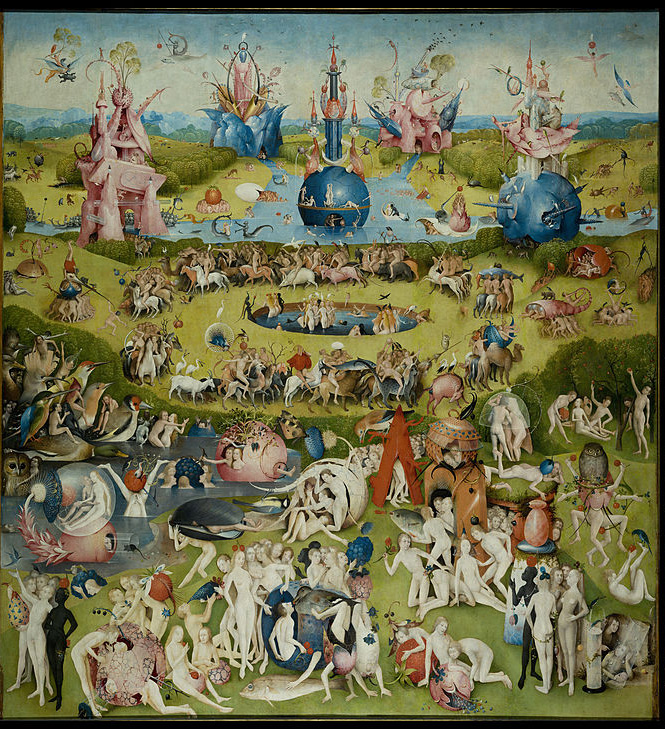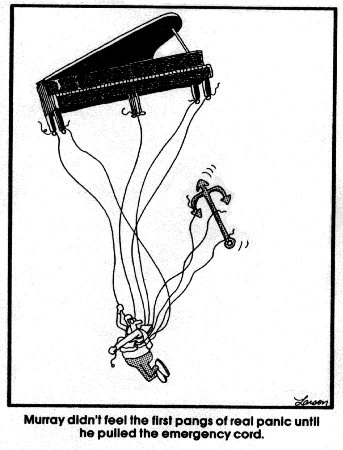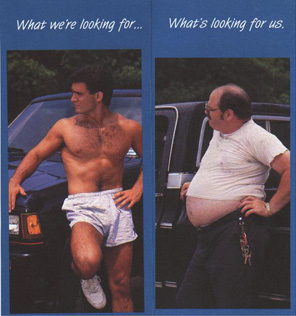- Anon woman
The Garden of Earthly Delights by Hieronymus Bosch

The Eleven Heavenly D e l i g h t s
The Garden of Earthly Delights by Hieronymus Bosch

Here is my candidate list:
1 Being transported by music
2 Experiencing a connection with nature
3 Humour
4 Learning
5 Being creative
6 Engaging in our passion
7 Making a difference
8 Friendship
9 Feeling the emotion called love
10 Physical affection
and last, but certainly not least,
11 Erotic gratification, aka sex.
As for the inflationary number, why should there not be more pleasures than pains? The idea is not to list all pleasures but to go beyond pleasure, to identify what moves us emotionally and even spiritually, in addition to being enjoyable. This is why chocolate, wine and hot baths are not on my list. Whereas the Deadly Sins cause us pain, the Delights cause us pleasure. More than that, they immerse us in the loftiest feelings and activities that being human offers. My choices are subjective and no doubt another person would compile a different list. However, I have selected pleasures accessible to all. Inevitably, there is overlap between the categories and the list is not exhaustive.
Music
Music has a unique appeal, not shared by any other human activity. It conveys emotions and expresses beauty in a way that nothing else can. Music lifts our spirits and allows us to access various pleasant states, such as joy, serenity, sweet melancholy and pulsating aliveness. It speaks to the heart, not the head. Music moves our feelings in a way that painting, architecture and sculpture cannot. It resonates with something like a tuning fork in the emotional part of my brain. Yet it can only do so if I have the requisite preparation, ie I need to be attuned to the piece in question. Nor will it touch me if I am not in the right mood.
We need to listen with an active ear and to really derive delight from music it should be in the foreground. Music is the easiest Delight to access. We can listen to our very favourite music whenever we have leisure. We can choose the music to suit our mood, or even to change it. Music is one of the few areas where anyone is free to enjoy the greatest masterpieces of the art. The only problem is that we need to develop sensitivity and discernment in order to do so. We can do this by listening to music that is challenging to us.
Music can express what words cannot. Maybe this is why it has a quality of transcendence, of taking us out of the mundane into another world. The pianist, Murray Perahia, was interviewed by Margaret Throsby. She asked whether he could perceive the personality of the great composers by examining their music. He said that he could feel their spirit, but that the personality revealed in the music could be quite different from how they were in normal life. For instance, Beethoven was deeply unhappy during most of his life, yet his music expresses joy. Perahia stated that music is a more perfect world, one that allows us to live our dreams and joys, and to resolve our dissonances. Something we cannot normally do in our regular life.
Nature
Feeling a connection with nature is usually less intense than being swept along by a Mozart piano concerto, yet I think these two Delights are similar. To appreciate nature requires being in a particular mind-set. For most of us, it is a sensitivity that takes time to develop, though perhaps it is inborn in some people. Even if we live in a large city, we can go to a garden, park or the sea. Even a single flower or an insect is enough to hold my attention and allows me to appreciate the intricate beauty of natural form. I think that all of us desire to escape from the sterile wasteland of shopping complexes, asphalt rivers and brick walls. This is why "nature escapes" appeal to the majority of tourists. I crave the feeling of being in a pristine wilderness where there is no sign of human activity.
To connect with nature is more than just an esthetic experience; it means reconnecting with what sustains us. Even though we live in cities and are surrounded by human-made things, nature is our true home. Indeed, we cannot escape it, for our bodies and even our minds are a part of nature and are subject to its processes.
Appreciating nature includes enjoying a vista, watching a pelican fly, dogs at play, feeling rain on a hot day, the crimson splash of bougainvillea, the softness of grass, seeing the sun sink into the sea, walking, mountain climbing, feeling the water as we swim, and the smell of a wet labrador in the back of the car. Of course, since we people are also part of nature, to appreciate the human form is a perfectly legitimate esthetic activity!

Humour is well connected to creativity, because not only is humour creative by its very nature, but the mechanism of humour, ie the clash of incompatible reference frames (see explanation), is the stuff of creative analogies and unexpected connections between disparate areas of life. The experience of humour relies on feeling an emotionally satisfying discharge of the emotional tension created by the collision of incompatible frameworks. For a joke to be funny the clash of the two levels needs to be resolved with unexpected inevitability. So the punchline has to be surprising and also seem logical.
Humour is not only the healthiest, most pleasant and safest of all defence mechanisms. It has gotten me out of some difficult situations, times when I could not find anything appropriate (and serious) to say. It can also act as a doorway to creative problem solving. Thus we might say, "What about if..." where the thought is intentionally ridiculous, but it might lead to something that is useful. One of the most reliable signs of sanity is being able to laugh at ourselves.
We live in a crazy, unfair and irrational world. Laughing at it is one of the few successful coping strategies. Humour helps to get things in perspective and lightens even the toughest situations. After the terrible Canberra bushfires a man met a friend in front of his burnt-out house. He said, "I'd offer you tea but I've run out of milk." Thus humour can let us transcend the direst situation, if only for a moment.
Learning
Of course I don't mean the hard slog of learning dates of battles or how to swing a tennis racket like a pro. Incremental learning is necessary but not really pleasant. What is enjoyable is when the pieces come together and we get the hang of the past tense in Spanish. This means adding a new
building block or insight to our mental store. To understand something new is to represent it internally in a way that relates to our pre-existing internal representations of the world. This enriches our inner world.
The real joy of learning is when we demonstrate to ourselves that we know or can do something that we didn't before. This could be a new skill, such as driving a car, soldering, skiing, weaving, swimming, getting out of crevasses, pottery, carpentry or repairing computers. It could be a mental skill, such as gaining fluency in Swahili, solving cryptic crosswords, playing speed chess, writing poems or remembering lists of items. It can also mean gaining an understanding of another person, or of why we ourselves do what we do. We treasure moments of inspiration, illumination or insight.
The delight of learning becomes tangible when we make a cake, a piece of woodwork, a stained glass panel, a photo book, a piece of jewellery, a straw hat, a sculpture or a poem, or execute a dance routine to demonstrate our skill in action.
Most of us learn to perform at a professional level of competence in our work life. It is enjoyable to reach that professional level and to exercise our new skills with confidence. Learning is about becoming more of what we can be, of realising another part of our potential.
Creativity
Without creativity we would have no civilisation. We would still be hunters and gatherers living in caves, without tools or language. Creativity is not a luxury or amusement but a necessity if there is to be any advancement in any area of life.
Since creativity is the generation of the new it is, and must always be, elusive and ineffable. It cannot be captured in any method or formula. The best we can do is try to enter a propitious mental space and to provide the right external circumstances for our creativity to manifest itself. Creativity calls for flexibility of mind.
There are myriad contexts in which we can do something creative. Some of the most accessible are writing, cooking, photographing, dancing, playing sport, drawing and conversing (including humour). We can be creative in a prison cell or while waiting at a bus stop. All it takes is imagination. Being creative gives me a jolt. It is fun because it feels like play. It is a freeing-up process where limits and preconceptions are transcended or discarded. It is empowering and fun because we experience being an originator, shifting the emphasis from being the passive recipient of other peoples' creativity to being ourselves a source of newness and change. Making something beautiful is a particular pleasure. Being creative is an expression of our power as human beings to make positive changes in our environment.
Julia Cameron wrote, "What liberates me to be creative is the willingness to be a beginner and to make beginner mistakes... To do something well we must first be willing to do it badly... It is impossible to get better and look good at the same time." Even if we have lots of experience we can pretend that we are a beginner, as this is the best way to innovate and improve. Beginners often ask basic questions that the experts have lost sight of because they no longer see things afresh.
Creativity feeds on itself. The more I practise or even think about an art or craft, the more ideas I get. It's pointless to wait for inspiration to strike. I find it valuable to remember or note down ideas I receive at random moments. We can foster creativity by giving it room to grow, by taking care, and by taking the time to think laterally. On the other hand, being consistent is greatly over-rated because it precludes learning. Likewise, stubbornness and rigidity are essentially the unwillingness to accept the richness and variability that are present in reality. Being creative means being a scavenger of ideas, images, techniques, connections, analogies, possibilities. It means being on a constant lookout for new ideas in the work of others, in nature, as well as in our own thoughts.
My music teacher used to say, "If you want ordinary results use ordinary methods. If you want extraordinary results use extraordinary methods." To be creative we need to go beyond using formulas and standard techniques. However, we need to know the rules before we start breaking them.
In terms of external factors we need to set up appropriate circumstances for our chosen activity. What is far more important is that we have to first find what it is that we really, really love to do. We also need to enter the right mind-set, eg we need to play chess for the love of it, not just because we like to win. When we do what we love doing we may experience flow.
Flow is even more elusive than creativity. Rowson defines it as the experience of optimal concentration, when there is no effort expended. The moment we make an effort to concentrate there is already a problem. Flow can be characterised as the situation where we are challenged at exactly the right level, one that stretches but does not exceed our abilities. It is also referred to as being in the zone. This is characterised by effortlessness of action and a state approaching bliss. We cannot turn on flow, but we can create conditions that help it to arise. We need to be prepared to immerse ourselves in the activity and to let go of all distractions.
When we are engaged in doing what we really love, time runs away from us and it is midnight before we know it. We steal time for the activity in question. While engaged in our passion we are likely to be innovative and creative, bringing forth our best talents. Being in the zone, whether during a game, taking part in an artistic performance, while dancing, or in an act of intellectual creation, transcends our ordinary consciousness.
There are many kinds of passions, such as playing sports or games, reading books we cannot put down, researching, drawing, writing, climbing, watching enthralling films and travelling to exotic places. In fact, this category is so broad that it could almost encompass all the others, as one can have a passion for almost anything. It catches aspects that may not be covered by the other rubrics.
Making a difference
We feel a special pleasure when something we do or say is of real benefit to someone else. Making a difference often occurs in the context of friendship, work or volunteer activities. It can mean giving a thoughtful gift, doing a favour, bolstering someone's self-esteem, creating a piece of art that is appreciated, or contributing to human knowledge. It may be as simple as advising someone on how to handle a medical problem. It may not be something directly for other people but to help animals or to benefit the environment.
My hero is Fred Hollows. When someone asked him how he came to tackle such an impossible problem as preventable blindness around the world, he answered that an impossible problem would be solving world hunger, whereas eye-care was something he could do. It is estimated that more than one million people can see because of his work.
Making a difference is not confined to the social level. It is equally important to be helpful and affirming of the people closest to us, especially family and partner. It comes down to love and the expression thereof. This is where we make a difference daily. Few of us will make an impact on the world, yet all of us have an effect on the people we meet, even if only briefly. A smile or a friendly remark make a difference. Even how we dress has its effect. Positive behaviour elicits positive reactions.
Making a significant difference means connecting with other people in an important way. It answers a basic human need: the need to be needed. It is a relief when our own actions give us confirmation that we are here for a reason.
Friendship
The pleasure of friendship is in sharing experiences, aspirations, feelings, hobbies and ideas. It relies on doing things together and enjoying each other's company. Friendship can provide mutual appreciation, which is a balm to the spirit. Unfortunately, men do not affirm other men, but mainly score jocular points at their friends' expense. Because male-female friendships usually avoid the grind of two egos, these are particularly valuable to males. When I think something positive about another person I usually say it to them.
The sharing of both highs and lows enhances our lives greatly. A sorrow shared is decreased, a joy shared is magnified. A friend can often give us an alternative perspective on our problem. Friendship thrives on intimacy, humour, laughter and taking liberties. To be a good friend to someone requires a commitment to help when they need us, as well as empathy and focussed listening. A close friend is someone we connect with on a deep level.
Like the other arts, friendship needs to be cultivated, or it will atrophy. If we see our friend only once every six weeks then all we do is "catch up". It is important to spend time with our friend sharing an ongoing enjoyable activity, such as sport, theatre or dancing.
Love
The feeling of love is the very apex of the pyramid of emotions. It can be enjoyed in the context of loving one's partner, parents, children, close friends and even pets, as well as in other contexts. Receptivity is important. If we are stressed, angry or depressed then the feeling is unlikely to develop within us. On the other hand, we can always think of someone we love, even if they are dead. Love does not come from outside but is a self-generated faculty. It is an attitude or orientation that we can foster or generate inside our psyche. To be loving is a decision rather than a feeling. It depends a lot on how we choose to see a person - people good at relationships have the habit of looking for things to appreciate in the other person. It is also our choice how deeply we want to step into intimacy. "Love is, above all, the gift of oneself" - Jean Anouilh.
Intimacy and vulnerability are key components of love. Intimacy is sharing our deeper feelings, such as hopes and fears. This blurs the boundary between ourselves and the other person, enriching and expanding us. Mutual vulnerability means revealing who we really are, including our negative points. This makes it easier to accept and like who we are, as well as bonding us to the other person. In a deeply intimate relationship we can relax in the comfort of being completely at home with the other person, and of being on the same wavelength. We can be ourselves, not pretending to be anything we are not, nor having to meet anyone's expectations. This is truly liberating.
Physical affection
Affection is love rendered physical. It is often experienced between lovers, but it need not be sexual. We can experience affection with a child, a border collie or in a heartfelt embrace when greeting someone. Examples of affection are caresses, kisses, sensual massage, holding hands, embracing, scratching another's itch or just touching a person's shoulder. Feet, hands and heads are particularly rewarding areas. Affection is characterised by tenderness and gentleness. Sometimes the lightest touch is the most evocative. Why I call it "physical affection" rather than just "affection" is because I read about a man who was instructed to be more affectionate to his wife. So he washed her car.
Reciprocation of affection is important, so that it is a dialogue. For many people affection is more important than sex. For me it is a vital need. Affection gives us physical pleasure, but more than that too. It creates an emotional connection, reminding us that we are in this together.

Creativity and imagination are needed to keep our erotic life vital and fresh, as repetition dulls both the mind and the senses. Are sexual perversions necessary? Perhaps not, but they inject variety and excitement into what could otherwise be a routine activity. There is an asymmetry in sex. Whereas the female libido is one of the mysteries of creation, males are easy to read. Their turn-ons are well known: short skirts, plunging necklines, stockings, bondage, oral sex. Yet despite all its byways, the underlying impulse of sex seems to be the urge to connect and even unite with the other person.
Although sexual feelings are intensified by the novelty of a new partner, intimacy has a similar effect coming from the opposite direction, due to a loving connection.
Unlike the other Delights, eroticism is heavily circumscribed by social taboos. The taboos simultaneously inhibit and stimulate our erotic feelings. The forbidden fruit is most tempting and prudery is the unexpected source of much pleasure. One person's erotica is another's porn. What is fascinating to one is off-putting, or simply does not register as being erotic with another. As well as being the most private, this is the most quirky and individual of the Delights. It is also #1 for many people.

Music is a powerful mode of expressing pure beauty, a beauty that touches our emotions. In addition, the best music has a hard to define quality, namely depth. This depth is not intellectual, nor does it necessarily derive from complexity. Rather, it is depth of feeling or depth of sensitivity. Because it holds meaning for us, music is more than pleasant sound. I submit that the best music is transcendent.
The grandeur and beauty of nature inspire lofty feelings in us, and like with music, experiencing the connection with nature is laden with meaning. As with music, the experience is difficult to describe in words, which suggests that it is something beyond the mundane.
Is humour spiritual? Surely spirituality is not a laughing matter? Humour, especially humour of the absurd, lifts us out of our ordinary existence. The combination of fantasy and absurd logic allows us to experience paradox on an emotional level. This can open doors that seem securely shut, or ones that are not even visible.
The spiritual aspect of learning is that we become something more than we were before.
The creative act frees us from operating out of habit, memory and routine. Much of our daily lives are spent in a machine-like mode, with repetitive actions yielding predictable results. To be creative is to be unpredictable and enlivening. Creativity shows us new ways of being human. It is transcendent because it opens doors that were not previously visible. We open avenues to fresh areas of meaning, which is spiritual. Above all, the meaning of life is something that each of us has to create for ourselves.
Engaging in our passion means striving to be the best we can in our chosen area. If we cultivate our passion sufficiently then we will cross boundaries and surmount some of our personal limitations. This is transcendence.
Making a difference has a spiritual dimension, as it means connecting with other people and enhancing their lives. A side-effect is that we grow in the process of being of service to others.
Friendship is an important context for generating and sharing meaning. It allows us to share what matters most in life, such as family and companionship.
If spiritual experience has any meaning then feeling the emotion called love must qualify as such. To love is to connect centre to centre with the other person, which is clearly spiritual.
Affection is more than a physical pleasure, such as eating or drinking, because it involves interacting with another being on an emotional level.
At first blush erotic gratification seems a base sort of activity, but is this really so? Orgasm is often called "the little death", meaning that the ego is temporarily extinguished. Not only is orgasm the strongest of all pleasures (with the possible exception of narcotic use), but it usually occurs in the context of a close relationship, so that intense pleasure binds two people together. Hence it may be the moment of greatest closeness between a couple. Is sex more physical or more mental? One could argue either way; moreover tantric yoga raises sex to the level of a spiritual practice.